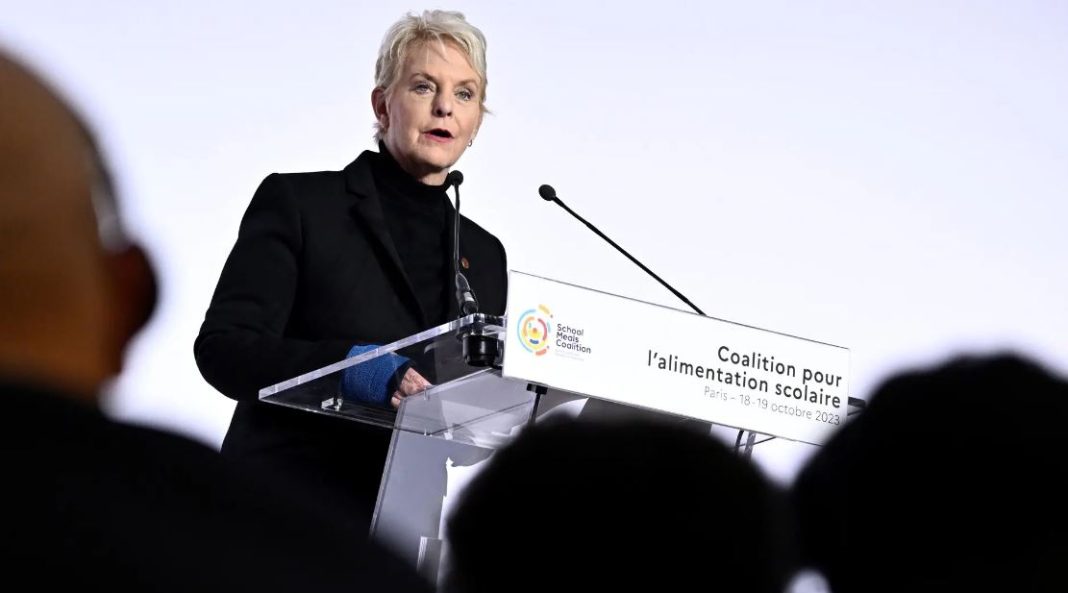As the Israel-Hamas conflict truce concluded, Cindy McCain, the executive director of the United Nations’ World Food Program (W.F.P.), faced internal backlash from staff accusing her of not using her position to advocate for Palestinian civilians in Gaza. In a virtual meeting, numerous global staff members expressed anger over McCain’s refusal to publicly call for a cease-fire, leading to calls for her removal. The contentious issue escalated as staff accused McCain of compromising the organization’s neutrality by attending an international security forum in Nova Scotia, where she was introduced in her U.N. capacity alongside former Israeli Prime Minister Ehud Barak.
A video of the meeting, shared with The New York Times, captured several employees strongly criticizing McCain for her alleged insensitivity to staff concerns. A woman speaking from Gaza on behalf of absent Palestinian staff accused McCain of failing them and questioned how she would rebuild broken trust. Additionally, the staff accused McCain of compromising the W.F.P.’s neutrality by attending the Halifax forum.
McCain defended herself in the meeting, citing a joint letter she signed with other U.N. agency leaders calling for a cease-fire in the Israel-Hamas conflict. Regarding her participation in the Halifax forum, she asserted her commitment to supporting her late husband’s legacy and received an award named after Senator John McCain.
The World Food Program did not provide an official comment, but Stéphane Dujarric, the United Nations spokesman, publicly defended McCain, stating that she was doing an excellent job and had the full support of U.N. leadership.
In a Face the Nation interview earlier in the week, McCain acknowledged the dire situation in Gaza, stating it was on the brink of famine, emphasizing the severity of the humanitarian crisis.
The internal strife within the World Food Program reflects broader tensions surrounding the Israel-Hamas conflict, with emotions running high across various institutions and organizations. The United Nations has not been immune to such tensions, experiencing disagreements over the language used in official documents, speeches, and comments made by senior officials.
Cindy McCain took on the role of executive director of the World Food Program earlier this year, appointed by U.N. Secretary-General António Guterres. With over 23,000 employees globally, the organization plays a crucial role in distributing food aid.
Staff members, speaking anonymously, accused McCain of not holding Israel accountable for what they perceived as using food as a weapon in Gaza. They contended that the lack of water, electricity, and the impact of Israel’s military offensive were contributing to starvation in Gaza.
While Dujarric praised the W.F.P.’s efforts in Gaza, emphasizing its role as the second-most-active U.N. agency providing aid, staff members voiced their displeasure during the meeting. Some boycotted the meeting in Jordan offices, and others staged a symbolic walkout, emphasizing their belief that McCain was defensive and unresponsive to their concerns.
The meeting failed to assuage the anger among staff members, with many viewing it as a belated attempt at damage control. Petitions with over 2,000 signatures collectively called for McCain to uphold humanitarian values, respect U.N. neutrality mandates, and advocate for a stronger humanitarian cease-fire in Gaza, leveraging the W.F.P.’s influence to prevent hunger as a weapon of war.
Staff members also submitted emails to the U.N.’s ethics office, requesting a review of McCain’s attendance at the Halifax event to determine its appropriateness in line with guidelines and policies. The internal turmoil underscores the challenges faced by international organizations in navigating the complex geopolitical landscape and addressing humanitarian crises amid conflicting perspectives.

